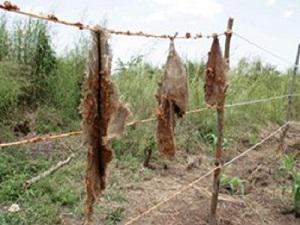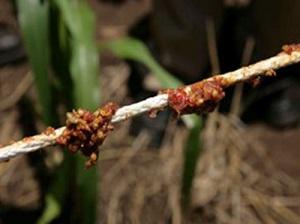Dickson Baseke
The aim of the project is to engage 40 green stewards and 20 cultural elders the projects aims to solicit for lasting sustainable solutions to human - elephant conflicts by integrating cultural values in the process.
Protected by Murchison Falls National Park, East-Madi Wildlife Reserve and the trans-boundary Nimule National Park (Sudan), the elephant populations in northern Uganda landscape increased during the twenty years civil war period and restarted using old migratory routes outside of the protected areas. Because there were no people in the villages this did not cause any problems.

Chilli fence.
Northern Uganda is now experiencing peace and people are returning home leading to increased agricultural activity. As a result, farmers and elephants are now increasingly in conflict. Elephants raid maize, feed in banana plantations and break into granaries in villages bordering the protected areas. More critically, elephants have killed up to 5 people in the past 2 years. These tragic occurrences have led to incidences of instability and in future could lead to the slaughter of elephants.

Chilli applied on strings.
Furthermore Northern Uganda is occupied by Acholi people. Traditionally the Acholi highly value and regard the elephant as a symbol of identification. This initiative proposes to integrate the cultural values that the Acholi people attach to the elephant into the managing the human-elephant conflicts at the same time develop a cadre of youths to champion the dissemination of innovative techniques in human-elephants conflicts prevention and resolution.
The project will last for 12 months and will be implemented in the areas surrounding Murchison Falls National Park and East Madi Wildlife Reserve. The project will target community youths who will be called green stewards and cultural elders.
The purpose for the initiative is to use a cultural approach to establish in the region a system for conducting conservation education and resolving conflicts over natural resources in a manner that it contributes to both biodiversity conservation and sustainable livelihoods through culture and traditional ecological knowledge.
We will work with a number of key players in the region who will include the Uganda Wildlife authority, who will provide the rangers to assist further our work in the region, and a cultural institution in the region to promote the cultural values that are congruent with the African elephant conservation in Northern Uganda.
The project will therefore equip the green stewards with techniques of resolving conflicts between the elephants and village farmers and in turn the green stewards will pass on this knowledge through scheduled trainings to the farmers in the villages. This will be combined with promotion of the cultural values of the Acholi which promote the conservation of the elephant.